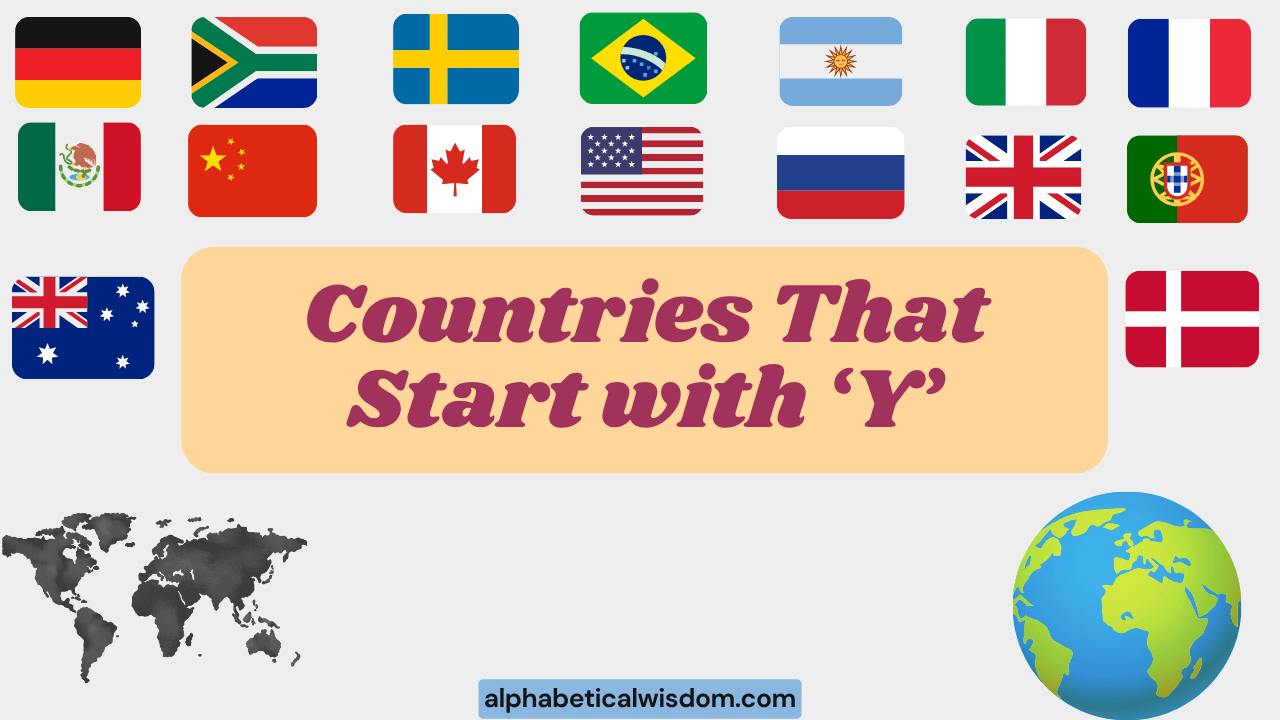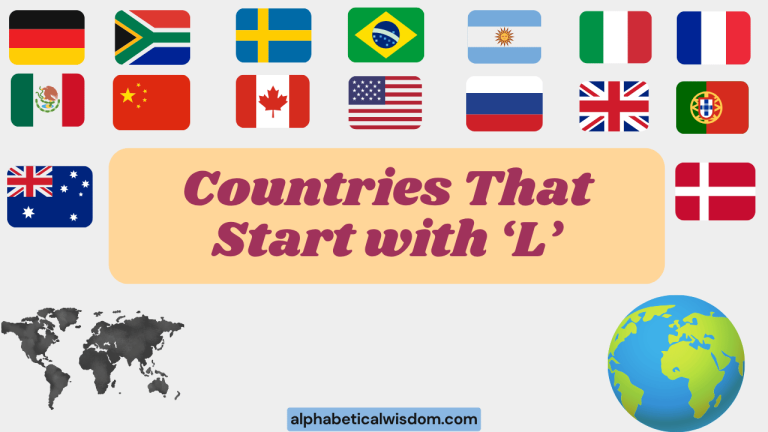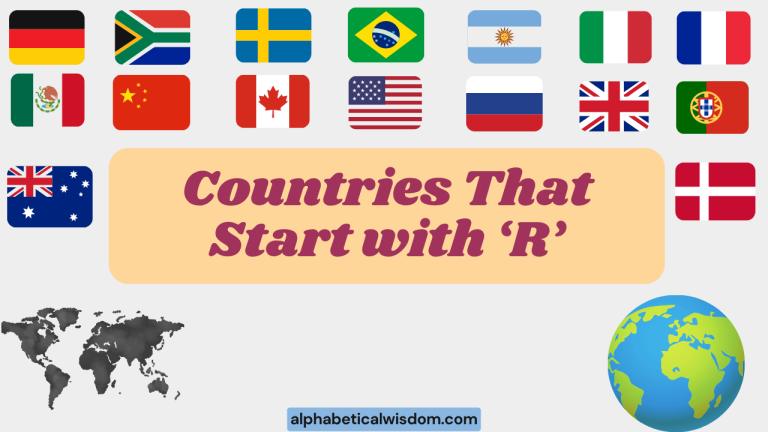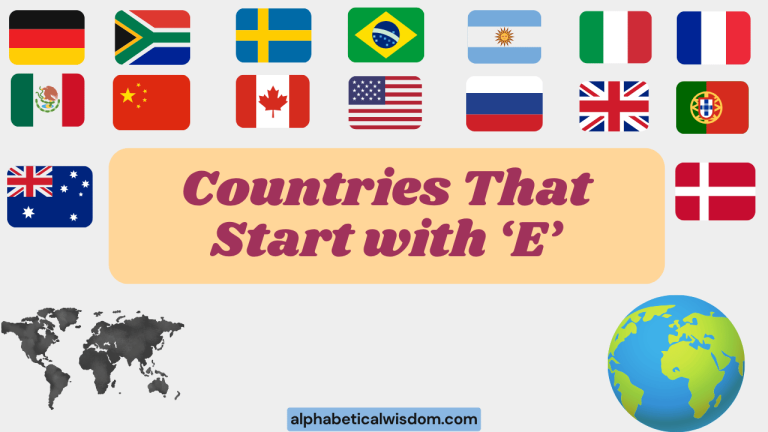Countries Starting with Y: Grammar & Usage Guide
Understanding how to correctly use country names, especially those starting with less common letters like “Y,” is crucial for clear and accurate communication in English. This article provides a comprehensive guide to the grammar and usage of countries beginning with “Y,” focusing on proper nouns, articles, adjectives, and common errors.
Whether you are an English language learner, a teacher, or simply someone interested in improving your grammar skills, this guide will equip you with the knowledge and practice necessary to confidently use these country names in various contexts.
Table of Contents
- Introduction
- Definition: Countries Starting with “Y”
- Structural Breakdown
- Types and Categories
- Examples
- Usage Rules
- Common Mistakes
- Practice Exercises
- Advanced Topics
- FAQ
- Conclusion
Definition: Countries Starting with “Y”
A country name is a proper noun that identifies a specific sovereign state. In the context of English grammar, these names function as singular nouns, although their usage can sometimes be more complex due to variations in political history and linguistic conventions.
For countries starting with “Y,” it’s essential to understand their grammatical role in sentences, including subject-verb agreement, article usage, and adjective formation. The primary countries starting with “Y” are Yemen and, less commonly, Yugoslavia (though Yugoslavia no longer exists as a unified country, its historical and grammatical context remains relevant).
Structural Breakdown
The structural breakdown involves understanding how a country’s name fits into different sentence structures. As proper nouns, they require capitalization.
When used as subjects, they determine the verb form. The formation of adjectives and demonyms (names for the people of a country) follows specific patterns that must be observed.
For example, from the country “Yemen,” we derive the adjective “Yemeni.” The correct use of articles (the, a, an) is also important, although most country names do not require an article unless they are plural or contain words like “Republic” or “Kingdom.” Understanding these elements contributes to grammatical accuracy and clarity.
Types and Categories
While the list of countries starting with ‘Y’ is relatively short, understanding their context is important. We can categorize them based on current existence and historical significance.
Current Countries
This category includes countries that are currently recognized sovereign states. The primary example is Yemen.
Historical Countries
This category includes countries that existed in the past but are no longer sovereign entities or have been divided into multiple countries. Yugoslavia is the main example.
Examples
The following sections provide examples of how country names starting with “Y” are used in various sentence types and grammatical contexts. The examples cover Yemen and also include Yugoslavia for historical context.
Examples in Sentences
This table illustrates the use of “Yemen” and “Yugoslavia” in various sentences, demonstrating their grammatical function as subjects, objects, and with prepositions.
| Category | Example Sentence | Grammatical Note |
|---|---|---|
| Subject | Yemen is located in the Middle East. | “Yemen” acts as the subject of the sentence. |
| Object | I have always wanted to visit Yemen. | “Yemen” acts as the object of the verb “visit.” |
| Prepositional Phrase | The history of Yemen is complex. | “Yemen” is part of the prepositional phrase “of Yemen.” |
| Historical Context | Yugoslavia was a socialist state in Southeastern Europe. | “Yugoslavia” is used to refer to a country that no longer exists. |
| Adjective | The Yemeni people are known for their hospitality. | “Yemeni” is the adjective form of “Yemen.” |
| Historical Adjective | The Yugoslav wars were a tragic period in European history. | “Yugoslav” is the adjective form of “Yugoslavia.” |
| Possessive | Yemen’s capital is Sana’a. | “Yemen’s” shows possession. |
| Historical Possessive | Yugoslavia’s breakup led to several new countries. | “Yugoslavia’s” shows possession in a historical context. |
| Subject | Yemen faces significant challenges due to the ongoing conflict. | “Yemen” is the subject of the sentence. |
| Object | The United Nations is providing aid to Yemen. | “Yemen” is the object of the preposition “to.” |
| Prepositional Phrase | Discussions about the future of Yemen are ongoing. | “Yemen” is part of the prepositional phrase “of Yemen.” |
| Historical Context | Many people remember Yugoslavia fondly, despite its challenges. | “Yugoslavia” refers to a past entity. |
| Adjective | Yemeni coffee is highly prized around the world. | “Yemeni” describes the type of coffee. |
| Historical Adjective | Yugoslav cinema produced many influential films. | “Yugoslav” describes the type of cinema. |
| Possessive | Yemen’s strategic location has often made it a point of interest. | “Yemen’s” indicates a characteristic or attribute. |
| Historical Possessive | Yugoslavia’s political system was unique during the Cold War. | “Yugoslavia’s” refers to a past attribute. |
| Subject | Yemen is a country with a rich cultural heritage. | “Yemen” is the subject, indicating the country’s attribute. |
| Object | She studied the history of Yemen during her university years. | “Yemen” is the object of the preposition “of.” |
| Prepositional Phrase | The traditions of Yemen are ancient and fascinating. | “Yemen” is part of the prepositional phrase “of Yemen.” |
| Historical Context | Yugoslavia was known for its diverse ethnic groups. | “Yugoslavia” refers to a country known for a specific characteristic. |
| Adjective | Yemeni architecture is distinctive and beautiful. | “Yemeni” describes the type of architecture. |
| Historical Adjective | Yugoslav society had a unique blend of cultures. | “Yugoslav” describes the society’s characteristic. |
| Possessive | Yemen’s economy relies heavily on oil exports. | “Yemen’s” indicates economic reliance. |
| Historical Possessive | Yugoslavia’s government structure was complex. | “Yugoslavia’s” refers to a past government structure. |
| Subject | Yemen continues to struggle with humanitarian issues. | “Yemen” is the subject. |
| Object | He wrote a book about the challenges facing Yemen. | “Yemen” is the object of the preposition “about”. |
Examples in Questions
This table provides examples of questions using “Yemen” and “Yugoslavia,” highlighting their role in interrogative sentences.
| Category | Example Question | Grammatical Note |
|---|---|---|
| Location | Where is Yemen located? | Asking about the location of the country. |
| History | What was Yugoslavia known for? | Asking about the historical attributes of the country. |
| Adjective | Have you ever tried Yemeni coffee? | Asking about something associated with Yemen. |
| Existence | Does Yemen have a stable government? | Inquiring about the current state of the country. |
| Historical Existence | When did Yugoslavia break apart? | Asking about a historical event related to the country. |
| Culture | What is Yemen famous for culturally? | Asking about the cultural significance of the country. |
| Historical Impact | How did Yugoslavia influence the region? | Asking about the country’s historical impact. |
| Travel | Is it safe to travel to Yemen? | Asking about travel safety conditions. |
| Past Events | What major events occurred in Yugoslavia during the 20th century? | Asking about historical events. |
| Products | Can you buy Yemeni products online? | Asking about the availability of products from Yemen. |
| Political System | What kind of government did Yugoslavia have? | Enquiring about the historical government system. |
| Future | What does the future hold for Yemen? | Asking about future prospects. |
| Legacy | What is the lasting legacy of Yugoslavia? | Asking about the country’s lasting impact. |
| Cuisine | Are there any famous Yemeni dishes? | Asking about the country’s cuisine. |
| Ethnic Groups | How many ethnic groups lived in Yugoslavia? | Asking about ethnic diversity. |
| Aid | Who is providing aid to Yemen? | Asking about aid providers. |
| Conflicts | What were the main causes of conflict in Yugoslavia? | Asking about historical conflicts. |
| Tourism | Can tourists visit Yemen safely? | Asking about tourism safety. |
| Leaders | Who were the key leaders of Yugoslavia? | Asking about historical leadership. |
Examples in Declarative Statements
Declarative statements provide information or facts about the countries. This section offers examples of such statements using “Yemen” and “Yugoslavia.”
| Category | Example Statement | Grammatical Note |
|---|---|---|
| Location | Yemen is situated at the southern end of the Arabian Peninsula. | Stating the geographical location. |
| History | Yugoslavia was formed after World War I. | Providing a historical fact. |
| Culture | Yemen has a rich tradition of storytelling. | Describing a cultural aspect. |
| Politics | Yemen has been facing political instability for years. | Describing the political situation. |
| Geography | Yemen has diverse landscapes, including mountains and deserts. | Describing the geographical features. |
| Economy | Yemen’s economy is largely based on oil production. | Describing the economic base. |
| Society | Yemeni society is known for its strong tribal structure. | Describing a social aspect. |
| Historical Fact | Yugoslavia was a non-aligned nation during the Cold War. | Providing a historical context. |
| Historical Fact | Yugoslavia consisted of six republics. | Providing a historical fact about its structure. |
| Historical Fact | The breakup of Yugoslavia led to several wars. | Describing the aftermath of its dissolution. |
| Political Context | Yemen is currently involved in a civil war. | Providing current political context. |
| Economic Context | Yemen’s infrastructure has been severely damaged by conflict. | Describing the economic impact of conflict. |
| Cultural Context | Yemeni music is influenced by both African and Middle Eastern traditions. | Describing cultural influences. |
| Geographical Context | Yemen has a coastline along the Red Sea and the Gulf of Aden. | Describing geographical location. |
| Economic Situation | Yemen relies heavily on international aid for survival. | Describing economic reliance. |
| Historical Context | Yugoslavia’s leader, Josip Broz Tito, maintained power for many years. | Providing historical leadership context. |
| Political Unrest | Yemen has experienced significant political unrest in recent years. | Describing political instability. |
| Cultural Heritage | Yemen is home to several UNESCO World Heritage sites. | Describing cultural heritage. |
Examples in Exclamatory Sentences
Exclamatory sentences express strong emotions or surprise. Here are examples using countries starting with “Y.”
| Category | Example Exclamatory Sentence | Grammatical Note |
|---|---|---|
| Surprise | Wow, Yemen is such a historically rich country! | Expressing surprise at the country’s historical richness. |
| Admiration | How beautiful the landscapes of Yemen are! | Expressing admiration for the country’s landscapes. |
| Sadness | What a tragedy the conflict in Yemen is! | Expressing sadness about the conflict. |
| Nostalgia | Oh, how I miss the days of a unified Yugoslavia! | Expressing nostalgia for the past. |
| Awe | Incredible! Yemeni architecture is truly stunning! | Expressing awe at the architecture. |
| Sympathy | What a difficult situation the people of Yemen are facing! | Expressing sympathy for the people. |
| Amazement | Yemen is still standing despite the devastation! | Expressing amazement at the country’s resilience. |
| Regret | If only Yugoslavia could have stayed together! | Expressing regret over the country’s breakup. |
Examples in Conditional Sentences
Conditional sentences express situations that depend on certain conditions. This section provides examples using “Yemen” and “Yugoslavia.”
| Category | Example Conditional Sentence | Grammatical Note |
|---|---|---|
| Present Condition | If the conflict ends, Yemen could rebuild its economy. | Expressing a present condition and its potential outcome. |
| Past Condition | If Yugoslavia had remained united, the region might be more stable today. | Expressing a past condition and its hypothetical outcome. |
| Future Condition | If you visit Yemen, you will be amazed by its culture. | Expressing a future condition and its potential outcome. |
| Hypothetical | If there were no conflict, Yemen would be a popular tourist destination. | Expressing a hypothetical situation. |
| Hypothetical Past | If Yugoslavia had not dissolved, its impact on the world would be different. | Expressing a hypothetical past situation. |
| Unlikely Situation | Even if Yemen achieves peace, recovery will take a long time. | Expressing an unlikely but possible situation. |
| Alternative Outcome | Had Yugoslavia adopted different policies, it might have survived. | Expressing an alternative outcome of a past event. |
Usage Rules
Understanding the proper usage rules for country names ensures clarity and accuracy in communication. This section covers articles, adjective formation, and possessive forms.
Articles with Country Names
Most country names do not require articles (the, a, an). However, exceptions exist for countries with plural names or those containing words like “Republic,” “Kingdom,” or “States.” For example, “the United States” requires an article, while “Yemen” does not.
Correct: I visited Yemen last year.
Incorrect: I visited the Yemen last year.
Forming Adjectives
Adjectives derived from country names are used to describe things related to that country. For “Yemen,” the adjective is “Yemeni.” For “Yugoslavia,” the adjective is “Yugoslav.” These adjectives are used to describe people, culture, products, and other attributes of the country.
Correct: Yemeni coffee is famous worldwide.
Incorrect: Yemenian coffee is famous worldwide.
Possessive Forms
To show possession or association, add an apostrophe and “s” (‘s) to the country name. For example, “Yemen’s” indicates something belonging to or associated with Yemen.
Similarly, “Yugoslavia’s” (in historical context) indicates something belonging to or associated with Yugoslavia.
Correct: Yemen’s capital is Sana’a.
Incorrect: Yemen capital is Sana’a.
Common Mistakes
Several common mistakes arise when using country names. These include incorrect article usage, improper adjective formation, and incorrect possessive forms.
Being aware of these errors can help improve grammatical accuracy.
Incorrect: The Yemen is a beautiful country.
Correct: Yemen is a beautiful country.
Incorrect: I love Yemenian food.
Correct: I love Yemeni food.
Incorrect: Yugoslavia’ government was socialist.
Correct: Yugoslavia’s government was socialist.
Practice Exercises
These exercises will help reinforce your understanding of how to use country names starting with “Y” correctly. They include fill-in-the-blanks, error correction, and sentence building.
Exercise 1: Fill in the Blanks
Fill in the blanks with the correct form of the country name (Yemen or Yugoslavia) or its adjective form (Yemeni or Yugoslav).
| Question | Answer |
|---|---|
| 1. _____ is located in the Middle East. | Yemen |
| 2. The _____ people are known for their hospitality. | Yemeni |
| 3. _____ was a socialist state in Southeastern Europe. | Yugoslavia |
| 4. _____ coffee is highly prized around the world. | Yemeni |
| 5. The breakup of _____ led to several new countries. | Yugoslavia |
| 6. The capital of _____ is Sana’a. | Yemen |
| 7. _____ cinema produced many influential films. | Yugoslav |
| 8. _____ strategic location has often made it a point of interest. | Yemen’s |
| 9. _____ political system was unique during the Cold War. | Yugoslavia’s |
| 10. She studied the history of _____. | Yemen |
Exercise 2: Error Correction
Identify and correct the errors in the following sentences.
| Incorrect Sentence | Correct Sentence |
|---|---|
| 1. The Yemen is a country with a rich history. | Yemen is a country with a rich history. |
| 2. I have always wanted to visit the Yugoslavia. | I have always wanted to learn about Yugoslavia. |
| 3. Yemenian culture is fascinating. | Yemeni culture is fascinating. |
| 4. Yugoslavia’ government was complex. | Yugoslavia’s government was complex. |
| 5. The traditions of the Yemen are ancient. | The traditions of Yemen are ancient. |
| 6. Have you ever tried a Yemen product? | Have you ever tried a Yemeni product? |
| 7. Yugoslavia consisted of many different ethnic groups. | Yugoslavia consisted of many different ethnic groups. |
| 8. I want to know about the Yemen’s history. | I want to know about Yemen’s history. |
| 9. The Yemen’s economy is struggling. | Yemen’s economy is struggling. |
| 10. Yugoslavia’s breakup was a significant event. | Yugoslavia’s breakup was a significant event. |
Exercise 3: Sentence Building
Create sentences using the given words related to “Yemen” and “Yugoslavia.”
| Words | Example Sentence |
|---|---|
| 1. Yemen, capital, Sana’a | Yemen’s capital is Sana’a. |
| 2. Yugoslavia, history, complex | Yugoslavia’s history is complex and multifaceted. |
| 3. Yemeni, coffee, famous | Yemeni coffee is famous for its unique flavor. |
| 4. Yugoslavia, breakup, countries | The breakup of Yugoslavia led to the creation of several new countries. |
| 5. Yemen, culture, rich | Yemen has a rich and ancient culture. |
| 6. Yemeni, traditions, ancient | Yemeni traditions are ancient and well-preserved. |
| 7. Yugoslavia, known, diversity | Yugoslavia was known for its ethnic and cultural diversity. |
| 8. Yemen, faces, challenges | Yemen faces numerous economic and political challenges. |
| 9. Yugoslavia, Cold War, non-aligned | During the Cold War, Yugoslavia was a prominent non-aligned nation. |
| 10. Yemeni, architecture, unique | Yemeni architecture is unique and reflects the country’s history. |
Advanced Topics
For advanced learners, exploring the historical context and idiomatic expressions related to these countries can deepen their understanding and appreciation of the English language.
Historical Context
Understanding the historical context of “Yemen” and “Yugoslavia” provides a richer understanding of their cultural, political, and social significance. Studying the history of Yemen, including its ancient civilizations and modern conflicts, enhances one’s comprehension of current events.
Similarly, understanding the formation, existence, and dissolution of Yugoslavia offers insights into the complexities of European history and politics.
Idiomatic Expressions
While there are not many common idiomatic expressions directly related to “Yemen” or “Yugoslavia” in English, advanced learners can explore how these countries are portrayed in literature, media, and academic discourse. Examining the nuances of language used to describe these countries can reveal deeper cultural and political perspectives.
FAQ
This section addresses frequently asked questions about the grammar and usage of countries starting with “Y.”
- Is it correct to say “the Yemen”?
No, it is generally incorrect to use the article “the” before “Yemen.” Country names typically do not require articles unless they are plural or contain words like “Republic” or “Kingdom.” - What is the adjective form of “Yemen”?
The adjective form of “Yemen” is “Yemeni.” It is used to describe things related to Yemen, such as “Yemeni coffee” or “Yemeni culture.” - How do I form the possessive of “Yemen”?
To form the possessive of “Yemen,” add an apostrophe and “s” (‘s) to the end of the name: “Yemen’s.” For example, “Yemen’s capital” refers to the capital of Yemen. - Is “Yugoslavia” still a country?
No, Yugoslavia no longer exists as a unified country. It has been divided into several independent states, including Serbia, Croatia, Slovenia, Bosnia and Herzegovina, Montenegro, and North Macedonia. - What is the adjective form of “Yugoslavia”?
The adjective form of “Yugoslavia” is “Yugoslav.” It is used to describe things related to the former Yugoslavia, such as “Yugoslav history” or “Yugoslav cinema.” - When is it appropriate to use “Yugoslavia” in a sentence?
It is appropriate to use “Yugoslavia” when discussing historical events, contexts, or aspects related to the former country. For example, “Yugoslavia was a socialist state” or “Yugoslav cinema produced many influential films.” - Are there any common mistakes to avoid when using “Yemen” in a sentence?
Yes, common mistakes include using the article “the” before “Yemen” and using incorrect adjective forms like “Yemenian.” Always use “Yemen” without an article and “Yemeni” as the adjective. - Why do some country names require articles while others do not?
The use of articles with country names depends on historical and linguistic conventions. Plural names (e.g., the Netherlands) and names containing words like “Republic,” “Kingdom,” or “States” often require articles. Singular names like “Yemen” typically do not. - How can I improve my understanding of using country names correctly?
To improve your understanding, practice using country names in various contexts, pay attention to how they are used in reputable sources, and consult grammar resources when in doubt. - Is it important to capitalize country names?
Yes, country names are proper nouns and should always be capitalized. This includes both the country name itself (e.g., Yemen) and its adjective form (e.g., Yemeni).
Conclusion
Mastering the grammar and usage of country names, including those starting with “Y,” is essential for effective communication in English. This guide has provided a comprehensive overview of the rules, examples, and common mistakes associated with “Yemen” and “Yugoslavia.” By understanding the structural breakdown, usage rules, and advanced topics, learners can confidently use these country names in various contexts.
Remember to practice regularly, pay attention to correct usage in reliable sources, and consult grammar resources when needed. By focusing on these key takeaways and continuing to refine your skills, you can achieve greater accuracy and fluency in your English language proficiency.
Keep practicing and exploring, and you’ll find your confidence in using these, and other, country names increasing steadily.






